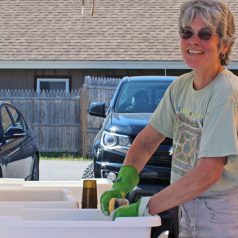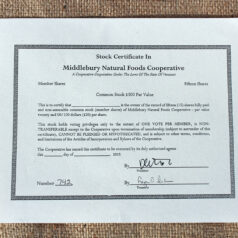
Climate Matters: Our Agriculture Must Be Transformed for Survival
By now, most people have seen headlines from the latest report of the Intergovernmental Panel on Climate Change (IPCC): This is our “do-or-die” moment. Nations need to collectively reduce their planet-warming emissions by roughly 43% by 2030 and stop adding carbon dioxide to the atmosphere altogether by the early 2050s to avoid escalating catastrophic weather events. The U.S., the world’s second-greatest emitter of the greenhouse gases responsible for climate chaos, isn’t even close to being on track to get emissions into a safe zone. The Inflation Reduction Act will help somewhat, but we still have a long way to go and we’re running out of time. The way we produce and consume food, especially the industrialized food system, which is highly developed in the U.S., is responsible for up to 37% of greenhouse gases; and climate chaos will wreak havoc in Vermont as elsewhere.
Agriculture and food-related businesses (from restaurants to supermarkets to composting) make a big contribution to Vermont’s livelihoods. Before COVID, about 65,000 Vermonters made their living from farms and food businesses. In New England, 219,000 jobs are indirectly a result of food system activity, at a total value of $71 billion. Food production in Vermont is concentrated on dairy, which accounts for approximately 70% of the state’s agricultural sales, uses over 80% of its working land, and helps to maintain our open landscapes. Beef and dairy cattle, however, along with pigs and other farm animals, contribute roughly 27% of methane emissions in the U.S., according to the EPA. Methane is relatively short-lived in the atmosphere, but it is over 25 times more potent at warming the planet than carbon dioxide. In addition to methane, manure applied to fields releases nitrous oxide, an even more powerful planet-warming gas; and additional emissions result from the production of fertilizer and running farm equipment.
The World Wildlife Fund claims that farmers must reduce their production of meat and dairy by a third in the next 10 years if scientific advice on limiting greenhouse gas emissions is to be met. Northern Ireland is already calling for a reduction of 1 million cattle and sheep to meet net-zero climate goals. But in the short term, if conventional Vermont dairy farmers reduce their herds, they move even closer to the bankruptcy cliff; and some argue that dairy production in other states will simply increase to compensate. On the consumer side, increasing numbers of people advocate for “plant-forward” diets, in which meat rarely if ever appears, or vegan diets that eschew meat altogether; and we now know that the production of beans, vegetables, and nuts emit less than half the greenhouse gases of animal products (with beef the biggest emitter). How can we make sense of this? What is a responsible path forward for producers AND consumers?
Producers face very difficult choices because their profit margins are so slim. Report after report tells us that agroecology or “ecological agriculture” that mimics nature, integrates cropping and livestock, incorporates agroforestry, and builds soil fertility is the best path forward. Agroecology is superior to the “climate-smart agriculture” touted by the U.S. government because it is also concerned with farmers’ livelihoods, good nutrition, restoring crop diversity and biodiversity, and building community well-being through investing in local and regional food systems. Yet agroecology is almost unknown in the U.S., although many of the practices that it encourages, such as organic agriculture, agroforestry, and rotational grazing on pasture, are growing in popularity and have strong environmental benefits. Scaled-up, agroecology would bring even more environmental and social advantages.
We would all benefit from more diversified agriculture in Vermont — diversification that will allow us to meet our fruit, nut, and vegetable consumption almost completely from Vermont products — as well as continuing to produce the meat and milk we consume. We ought to reduce red meat consumption substantially for health reasons and switch to pasture-raised meat. Dairy cows bred to beef bulls are a promising way to get better quality beef and diversify dairy farmers’ income. But the surest way to diversify is to make land, technical support, and financial support available to farmers who commit to using agroecology. Most young farmers are excited about its potential, while they are turned off by the prospects of conventional dairy farming. How about making farmland available to dairy farmworkers or other migrants who are fleeing regions made uninhabitable by climate disasters, lack of jobs, or conflict? Many migrants have farming backgrounds and are eager to contribute to their new homes. Food can help to knit together cultures as disparate as Somali Bantu and Yankee, as the Little Jubba Agrarian Common in Maine has discovered.
Climate chaos is a systemic problem that won’t be solved by individual actions. Shifting the responsibility to people who continue eating meat or don’t drive electric vehicles (yet) or haven’t replaced incandescent light bulbs with LEDs is an industry cop-out. These actions are all good, of course, but they aren’t nearly enough. The first thing that needs to happen is to stop drilling for oil and gas, stop pipelines and stop investing in extraction. This requires a big policy shift, based on the recognition that immediate change is essential for survival. It also requires major investments in reducing our need for energy (such as weatherizing and green roofs); subsidizing renewable energy (wind, solar and small-scale hydro in Vermont); and the infrastructure needed to live with renewables (free electric public transportation, standardized charging stations).
The food system also must re-orient to producing healthy food as locally as possible and paying its true cost, making sure everyone can access it by guaranteeing a livable wage to workers and an adequate safety net for children and others who can’t work, and protecting environmental quality so that future generations will have good food and a healthy environment. To accomplish this, we must wrest control from food industries so that farmers and communities can once again have real choices, decent prices for what is produced, and sound nutritional advice.
—————
Molly Anderson is the William R. Kenan Jr. Professor of Food Studies at Middlebury College, where she teaches and directs the Food Studies Program. She lives in Middlebury and serves on the Middlebury Natural Foods Coop Board and the Middlebury Conservation Commission. She is interested in food system transformation toward healthier, more just, and environmentally sustainable options.
















